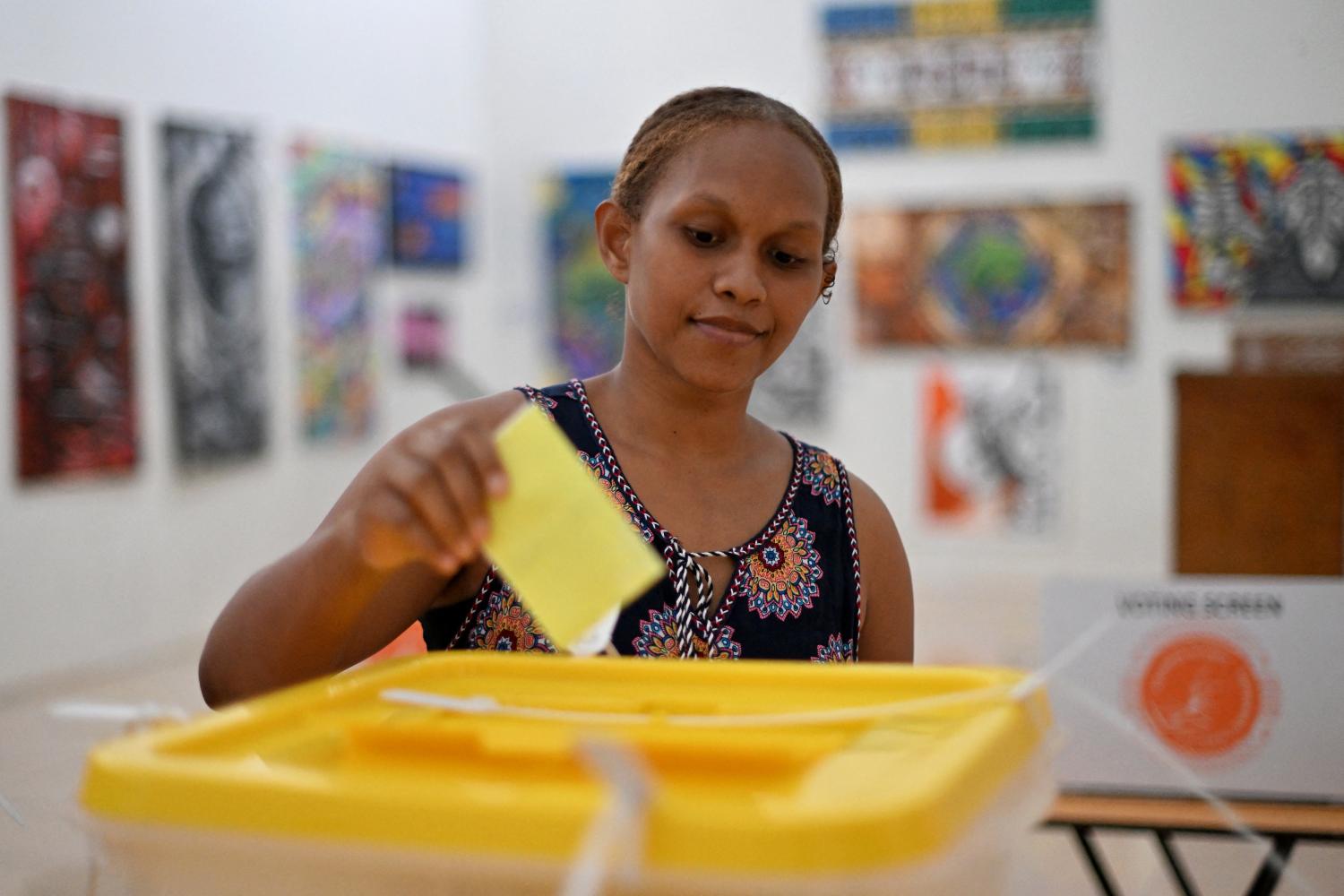The Solomon Islands election of 17 April was widely anticipated to result in a sweeping victory for Manasseh Sogavare’s government. Sogavare, who has been prime minister on four separate occasions, is only the second head of government in his country’s history to serve a full term. He fended off an opposition no-confidence challenge in late 2021, extended his parliamentary term for seven months to 2024, and presided over a diplomatic switch from recognising Taiwan to links with China in 2019. A subsequent security deal with Beijing in April 2022 and the deployment of Chinese police to the capital, Honiara, led Australian media reporters to warn of an emerging Chinese-assisted authoritarian regime. Yet what transpired on 17 April was an emphatic defeat for the ruling party.
Never before had an entire Solomon Islands cabinet gone into an election all contesting for a single party, Sogavare’s Ownership, Unity and Responsibility (OUR). The only exception was a minister from the west of the country who stood aside to allow her husband to take her seat for the OUR party.
Yet 18 of the incumbent OUR ministers lost their seats and none of the party’s ten newer challenger candidates was successful. The economic downturn since 2020, and a major contraction in log exports to China, conflicted with Sogavare’s promises of considerable developmental gains arising from the new diplomatic disposition.
Worse still, OUR suffered a major setback on the island of Malaita. Following the diplomatic switch to China, the provincial government on Malaita had defied the national government by retaining links with Taiwan, with some assistance from the United States. In early 2023, after a protracted showdown, the island’s premier, Daniel Suidani, was ousted in a no-confidence vote that was openly orchestrated by the national government. He was replaced by a pro-China administration led by Martin Fini. Yet in the provincial elections, which were held simultaneously with the national elections on 17 April, not only was Suidani returned to the provincial assembly but his successor as premier lost his seat. Four of the eight OUR incumbents representing Malaita in the national parliament were ousted. In the west, Sogavare fought off a strong challenge in his own East Choiseul constituency, where he claimed that the United States backed his major rival.
Sogavare’s OUR party remains the largest party, with 15 seats in the 50-member parliament. Former opposition leader Matthew Wale and his Democratic Party has 11 seats, and Peter Kenilorea, the son of the country’s first post-independence prime minister, has 6 or 7 seats for his United Party. At least ten independents have been elected, while the remaining seven MPs belong to smaller parties, including Marovo businessman Amoi Chachabule’s Peoples First Party with three seats.
In Solomon Islands, party affiliations have limited significance. MPs regularly switch sides in search of ministerial portfolios or other advantages. After elections, parliamentarians habitually gather at the major hotels in Honiara, with Sogavare’s camp presently installed in the Cowboy’s Grill in eastern Honiara, Wale’s group at the Heritage Park, and former Prime Minister Gordon Darcy Lilo – re-elected after two terms in the wilderness – having established a base at the Honiara Hotel in Chinatown.
Sogavare may have failed to secure victory for his incumbent cabinet, but in the past he has found other roads to power. In 2000 and 2006, he took office in the wake of violent disturbances and at the head of highly fragmented parliaments. In 2014 and 2019, he took advantage of schisms in the major post-election coalitions and forged alliances with wavering first-time MPs, leaving many longer-standing incumbent MPs on the opposition benches. Former opposition leader Matthew Wale was outmanoeuvred after both elections.
The present system gives an enormous advantage to opportunist MPs who are prepared to sit on the fence waiting for maximum advantage. It also gives the upper hand to less scrupulous would-be prime ministers who are prepared to make the necessary payoffs.
Solomon Islands citizens, particularly those in Honiara and in Auki, the provincial capital of Malaita, are not oblivious to corruption among political elites. That hostility fuelled major riots in 2006, 2019 and 2021. Urban disquiet about Manasseh Sogavare’s recently exposed real estate deals in Honiara raises that risk. OUR won none of the Honiara seats. Reputational damage, and the risk of political instability, is also a factor influencing post-election coalition formation in Solomon Islands.
If violence does again ensue, Australia, New Zealand, Papua New Guinea and Fiji have a far larger force on the ground than in 2019 or 2021 to try to nip it in the bud.


